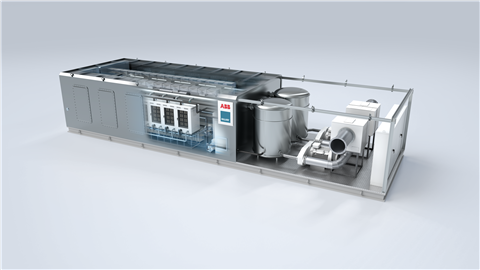High-powered marine fuel cell concept wins AiP
23 February 2022
Diverse range of applications expected
ABB and Ballard have received an approval in principle (AiP) for a high-power fuel cell concept designed for marine applications.
The companies said the AiP from DNV is a major milestone in developing new technology, since it is an independent assessment of the concept and confirms that the design is feasible and no significant obstacles exist to prevent the concept from being realized. With the AiP in place, the jointly developed solution can be completed within the next couple of years for application onboard a wide range of vessels.
Seen as flexible solution
The high-power fuel cell unit is a flexible solution that will support the energy needs of a diverse range of vessels requiring multiple 3 MW blocks of power. A cruise vessel operating in coastal areas could either run entirely on fuel cell power or switch to it when operating in environmentally sensitive areas or emission control zones, while a ferry with a regular schedule and frequent bunkering opportunities could operate solely on fuel cell power, according to the companies.
For ocean going vessels, fuel cell power could support auxiliary needs. The concept of the solution also envisions the integration with an energy storage system.
“This AiP is an important milestone in making high-power fuel cells commercially available, and it underpins our commitment to bring new levels of efficiency, reliability and sustainability to the global shipping industry,” said Juha Koskela, Division President, ABB Marine & Ports. “As we continue to pave the way towards decarbonizing shipping, we are confident that vessel electrification, including fuel cell technology, will play a pivotal role in helping the marine industry achieve its environmental targets.”
The successful development of a high-power fuel cell system concept builds on a collaboration between ABB and Ballard, the leading global provider of proton exchange membrane (PEM) fuel cell solutions, initiated in June 2018. As part of its strategy to develop alternative emission-free technologies, ABB said it is already well advanced in collaborative development of fuel cell systems for ships. Zero-emission hydrogen fuel cells are already powering smaller vessels over short distances and the technology is on the verge of being ready for installation on larger ships.
“ABB’s industry-leading experience in marine solutions and Ballard’s expertise in development and deployment of megawatt-scale fuel cell systems for land-based use has proven to be the right combination, enabling us to take the next step in our joint efforts to make this technology available for larger vessels,” said Jesper Themsen, president and CEO of Ballard Power Systems Europe A/S. “Securing an AiP offers a signpost to the maritime industry regarding the potential of this truly transformative concept.”
Reducing emissions
Shipping contributes close to 3% to global greenhouse gas emissions (GHG) every year and pressure to transition the industry to more sustainable power sources has resulted in fixed reduction targets from the International Maritime Organization (IMO), a United Nations agency responsible for regulating shipping. IMO aims to cut for GHGs from ships by at least 50% by 2050 from 2008 levels.
 ABB and Ballard say they have reached a milestone towards fuel cell-powered marine transport. (Image: ABB)
ABB and Ballard say they have reached a milestone towards fuel cell-powered marine transport. (Image: ABB)
Fuel cells turn the chemical energy from hydrogen into electricity through an electrochemical reaction. When renewables are used to produce the hydrogen, the entire energy chain can be clean. Having a larger, megawatt-scale power unit makes it feasible to combine units to reach much higher total power than is practically possible with smaller power units.
Demand for hydrogen, which has grown more than threefold since 1975, continues to rise. Scaling up technologies and bringing down costs of production is vital to enable hydrogen to become widely used. ABB is collaborating with customers and partners to develop and integrate technology that will make hydrogen an accessible, affordable component of the world’s low carbon energy mix. In Italy, ABB is partnering with Swiss utility company Axpo to develop modular green hydrogen plants that aim to create an optimum operating model to produce affordable, green hydrogen. In France, ABB is supplying its Freelance distributed control system and ABB Ability Manufacturing Operations Management digital platform to the first production site for Lhyfe, a producer and supplier of 100% green hydrogen. ABB is also working with Hydrogen Optimized, a sustainable energy conversion company in Canada, to jointly explore the development of large-scale green hydrogen production systems connected to the electrical grid to offer a clean, sustainable, and affordable energy carrier.
STAY CONNECTED




Receive the information you need when you need it through our world-leading magazines, newsletters and daily briefings.
POWER SOURCING GUIDE
The trusted reference and buyer’s guide for 83 years
The original “desktop search engine,” guiding nearly 10,000 users in more than 90 countries it is the primary reference for specifications and details on all the components that go into engine systems.
Visit Now
CONNECT WITH THE TEAM










